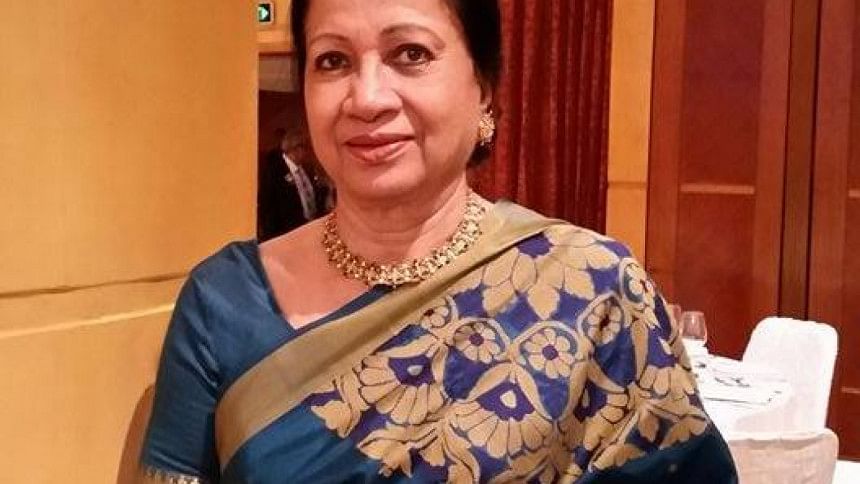Salma Khan: A mind without fear and a head held high

Today I have set out to write one of my most difficult columns. Difficult, because I am writing about a person who is so intimately entwined in my existence that it will be hard to separate myself from her larger-than-life persona. This is a humble tribute to my late aunt, Salma Khan (lovingly known to the family as Situ), who passed away last week.
Before I recount my aunt's multiple contributions and achievements, it may be appropriate to touch upon her challenging childhood.
Situ was merely a toddler when her father prematurely passed away. Her world suddenly shifted from security to uncertainty, the future turning into a question mark. But her mother – my grandmother – took up the difficult task of raising and educating her seven children with great fortitude. Situ grew up under the aegis of a matriarch who never cowed under pressure and did not differentiate between her four sons and three daughters. The unconstrained and liberal environment at home proved ideal for a talented woman like Salma to navigate the rapids of life with utter confidence, ability, and a belief in herself.
Salma Khan's many accomplishments cannot be encapsulated in a single column, but let me highlight the important ones. Although she herself was comfortably placed in the social structure, Salma was a feminist. She invariably stepped out of her comfort zone and walked the extra mile with the less fortunate. Whether it was fighting for equal rights of female workers or rallying against the domestic violence that women are subjected to – she left her footprint by challenging the many injustices and inequities. In the process, she raised public awareness and helped reshape our social and political consciousness, especially towards women.
As a member of the Planning Commission, she was instrumental in mainstreaming gender issues in the macro framework of the country's Five-Year Plans. She was always unafraid to act; I closely observed her in meetings where she took on a horde of men resisting her ideas. Apart from exceptional courage, her greatest quality was that she did her homework and articulated her viewpoints forcefully and persuasively.
Her attributes were recognised at international forums. She became the founder chairperson of NGO Coalition on Beijing Process (NCBP), a network of 624 NGOs working towards the implementation of the Beijing Platform for Action. She distinguished herself as the first Asian chairperson of the UN Committee on the Elimination of All Forms of Discrimination against Women (CEDAW). Having worked in the CEDAW Committee for over 12 years, she left her mark in the UN human rights system. As the ambassador to Indonesia, Salma Khan demonstrated to the international community that women in Bangladesh could rise to the highest levels, not only in politics, but also in the government sector.

In her book The Fifty Percent: Women in Development and Policy in Bangladesh, Salma Khan gave visibility to the invisible by exposing the exclusion of women from development activities. Her research revealed that, despite being in a disadvantaged socioeconomic situation, and contrary to patriarchal beliefs, women contribute substantially to the economy. She thus inspired women to "act" for their rights, rather than be passive dissenters.
My narrative about Situ would remain incomplete if I did not write about the woman she was. Recently, while a few of us were in the middle of a discussion on how to be a "real woman," a female friend commented, "I am so confused trying to decide whether to be a Betty Crocker and bake cakes or a Virginia Woolf and work toward women's emancipation." Although the remark was made flippantly, I immediately thought of my aunt Salma, for she was the first woman who taught me that there was no need to make these choices. Real emancipation of a woman lies in forging her own path professionally, socially, and in her personal life. Salma Khan was a good wife (to her extremely supportive husband, Habibullah Khan), a loving mother, a dutiful daughter, a loyal friend, a doting grandmother, and also an excellent professional. Her household chemistry was so well-balanced that her mother and mother-in-law lived with her, under the same roof, in perfect harmony. She believed in strong family ties and made special efforts to lend support to her near and dear ones whenever they needed her. I will never forget that when I was going through a difficult transition in my life, she arrived at my doorstep in remote Yerevan in Armenia to give me moral strength. There are countless ways she helped her relatives, friends, and domestic help – most of which will perhaps remain unknown.
My aunt was the first to tell me about Prof Yunus' work in Grameen Bank and how the programme's income-generating activities empowered women. She made me aware about Brac schools and their impact on girls' education long before I joined the World Bank as an education specialist. This knowledge inspired me to approach development work with passion, not just as a profession. And every time I feel the urge to protest against some inequity or injustice, I remember how Situ implanted a seed that helped me understand how important it is to enable the voices of the disempowered to be heard.
Salma Khan sparked a dynamic change with long-lasting implications in many lives. For my cousins, my sister and I, she was an aunt, a second mother, and a friend. But above all, she was the wind beneath our wings – as I hope she will be for many young women of the new generation.
Wherever you are Situ, you will always make the champak trees bloom. Rest in peace under their fragrant canopy.
Milia Ali is a Rabindra Sangeet exponent and a former employee of the World Bank.

 For all latest news, follow The Daily Star's Google News channel.
For all latest news, follow The Daily Star's Google News channel. 



Comments